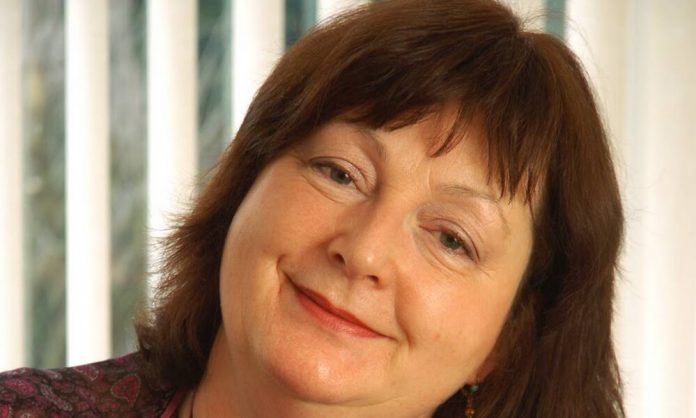Today Harlequin Mill & Boon multi-published author Kate Walker stops at Romance Book Paradise on her celebration tour for THE RETURN OF THE STRANGER , and she’s with some giveaways!
But before we give over to her, just a reminder….check on the sidebar for links to follow KATE WALKER and CHRISTINA HOLLIS blog tours for MEGA GIVEAWAYS!
So over to Kate now…
Whose Line is it Anyway?
Here in the UK we used to have a very successful TV series called Whose Line is It Anyway? It was based on the idea of improvisation exercises done by actors in the theatre. The compere, or the audience would suggest a topic, a couple of characters and the contestants – successful actors, comedians etc would act out a scene based on those elements. But the scenes they were acting out were only brief, temporary, for fun – they weren’t planning to build an actual character on them, or put them into a play – or develop them into a full-scale production. They were just playing.
But some people think that the best way to approach writing romance is to do exactly the same with a book – pick a couple of characters, add in some conflict – write the book. And then decide what line to aim it at. I’ve done a couple of workshops this past two weeks and at both of them, when I asked which line they were aiming their romance at, several people looked at me with that ‘Huh?’ expression on their face. Even worse, when I asked what books they had read recently, some had read none – and others had read books bought second-hand from the local book exchange or charity shop. They were romances, they insisted – so they were 10, 15 years old. How had the books changed in those 15 years?
I gave my usual reply – how has society changed in the last 15 years? I’ve just had my 60th title published – I’ve been published for over 25 years – and I would never submit a novel like my very first romance – The Chalk Line – to today’s market without some very serious editing and rewriting.
Some people don’t even know there are so many very different lines. And they don’t know the type of book, the sort of conflict, plot, characters – the sensuality levels – that each line demands. And then they wonder why their book is returned as ‘not suitable for the very specific demands of the XYZ line.’
I think it’s vital to know about the line you are targeting, it’s specific demands – and why you want to write for that line. Otherwise you can find yourself lost and wandering in a publishing desert with a book that no one seems to want.
Say you write the book and send it to line A Editor, A thinks it has too many sensual scenes for her line – she sends it back to you
If you’re really lucky – and believe me, it’s rare- she’ll:
- Tell you why she sent it back.
More likely it will be - Just sent with a form letter – ‘these are the usual reasons why we return mss.’
If it’s (1) You could get to work on it, cut all the sensual scenes, and then find that she still rejects it. And you might have cut the heart out of your book because the book of your heart might be a Presents/Modern or a Blaze
If it’s (2) Then you could send it to another line – having no idea really why it came back – and so not knowing which one to try for the best – and you could be trying and trying again for years – because we all know how long it can take an editor to get to read a book!
Okay, so targeting will save you time at the submitting stage. It will also save you time and energy at the writing stage.
Say you happily write your novel putting in plenty of mystery, intrigue, lots of secondary characters, some highly passionate scenes. Then you think about where to submit it – and you’ll find that you’ll come up against a ‘pruning’ problem. Send it to one line and they could say :
“Good book – but you need to cut the secondary characters.’
OR
‘Good book but you need to cut out the intrigue’
OR
‘Good book but you need to cut the sex’
And that’s only if they bother to say anything!
So now you are faced with the fact that you have to cut X thousand of your precious words – which is hard enough. It’s like a cutting off part of your baby! But equally you have to think of something else to put in its place. Which can be even harder.
And all the while, time is passing. You’re editing the book again – and if you’re not careful you can edit the life out of it. The more times you rework a novel, the less of the spontaneous, passionate, from the heart stuff you leave in. And what started off as something with a heart and soul and guts can end up as a pale shadow of itself. And I should know I’ve been there.
 I started writing before there was a split between Romance/Cherish and Presents/Modern here in the UK- and before RIVA had even been dreamed of. I just wrote a book and sent it in. I didn’t think about the big bad world beyond the UK publishing market. I had a writing career. I was happy. I didn’t realise how it could be any better. But in America, some of my books went into Harlequin Romance, some went into Harlequin Presents and as a result, often my readers didn’t know where to find me. Or if they were someone who enjoyed a Romance line book they would never buy one I’d written that went into the Presents line. It was only about 1991 – 6 years into my career – that editorial UK wanted to split the lines – and I needed to choose which line I particularly wanted to write for. I could write for either – I was published in either – but I could only write for one. The voices of each line, the demands for each one were too different.
I started writing before there was a split between Romance/Cherish and Presents/Modern here in the UK- and before RIVA had even been dreamed of. I just wrote a book and sent it in. I didn’t think about the big bad world beyond the UK publishing market. I had a writing career. I was happy. I didn’t realise how it could be any better. But in America, some of my books went into Harlequin Romance, some went into Harlequin Presents and as a result, often my readers didn’t know where to find me. Or if they were someone who enjoyed a Romance line book they would never buy one I’d written that went into the Presents line. It was only about 1991 – 6 years into my career – that editorial UK wanted to split the lines – and I needed to choose which line I particularly wanted to write for. I could write for either – I was published in either – but I could only write for one. The voices of each line, the demands for each one were too different.
I didn’t have much of a problem deciding which line I wanted to write for – or focussing on that line when I’d decided this was for me – but I had, not wasted, but messed up the start of my career at the vital, vulnerable point when it was just starting. And in many ways I had to build it all over again.
So when you’re looking at a line, not just from the point of view of reading and enjoying it, but with the idea of writing for it you need to consider so many things. You’re looking at:
- EMPHASIS – how much is given to which aspects of the story. So with the question of whether a book is a Blaze or an Intrigue, it’s whether the emphasis is on the sexual relationship (Blaze) or solving the mystery (Intrigue)
- INTENSITY – an example would be Presents/Modern versus Romance /Cherish – and now with the RIVA/Presents divide too. In a Romance it’s perfectly possible to have your H&h actually like each other all the way through – in a Presents that would be rare. A Romance has a hugely emotional intensity, in a Presents this is often mixed in with other emotions like anger and revenge and sexual desire. RIVA can have all of those too but these books tend to be a lighter, sassier read, with a conflict that is less dark, less balanced on a knife-edge. And the hero, while alpha, is less of a dominating force.
- CHARACTERS – in a Presents too many other characters would diffuse the intensity. In a Superromance more characters would be an asset.
- SEX – yes, this has to be considered, but not that in one line it’s not allowed and in another it is – you can have a book where there is just one major passionate scene but it is a Presents/Modern because of the – that word again – intensity – of the rest of the relationship. Or one where they make love openly and clearly on the page but because the atmosphere is very different it is a gentler Romance.
- CONFLICT – this is a major point in deciding which line you’re aiming for. Obviously, from what I’ve been saying, a line like Presents/Modern has greater scope for a stronger conflict (But make sure you don’t confuse ‘conflict’ with simply ‘argument’) And in an Intrigue then the conflict needs to be based around the mystery element.
SUBPLOTS – does the line have room and word count enough for them or not – once again it’s the emphasis that makes the difference.
And once you’ve considered these for the lines, you need to consider them for your own work – and of course your own reading. Which do you prefer? Why? Michelle Styles always remembers that she knew she had to choose the line of her heart because I said that Harlequin are not looking for one book authors – they are looking for career authors. You need to consider if you can imagine yourself writing 10, 20, 30 + books for this line and not get bored.
And that’s one of the reasons why this topic is on my mind today. At one of those workshops, talking about the books I loved to read, the heroes that attracted me, I said that I was always drawn to the ambiguous hero, the dark character who could, with a little movement either way, could be the hero – or he could turn out to be the villain. I always preferred the wild, sprawling, dark, intense dramas of the Bronte Sisters rather than the more controlled, elegant, mannered stories of Jane Austen.
And that’s why I was chosen to write my current book – The Return of the Stranger which is part of the Powerful and the Pure mini-series. Books inspired by some of the great classics of Romantic Fiction – Pride and Prejudice, Emma, Jane Eyre or, in my case Wuthering Heights, with its ultimate dark and dangerous ambiguous hero – Heathcliff. It’s a book I’ve loved ever since I was a child. I’ve reread it more time than I can actually remember and I’ve studied it again and again at school and at university. You don’t have to have read the original to enjoy this book – but the fact that it is so much a part of my reading – and writing history shows why I write what I do. If I’d written for Romance or Medicals, or even RIVA then I’d never have been asked to write The Return of The Stranger – but I loved doing it, and loved honouring one of my favourite reads of all time by doing so.
So, if there had been that split in the lines in the UK when I first started writing, I know which line I would have wanted to read most – which one I would have enjoyed most. And so if I’d known there had to be a choice – and there does have to be a choice because you have to send your ms to a particular editor on a particular line – I know I’d have chosen Presents/Modern and I’d have slanted my ms that way. I’ve written both in my time and I know that the differences between them can be subtle and perhaps difficult to see – but they are there. Ask anyone who loves a particular line and they’ll tell you.
Those differences are what bring readers back to a particular line again and again – and, you hope, to your stories time after time too. Targetting isn’t about restrictions. It’s about writing to your strengths – and focussing those strengths where they are best suited. So get reading. Read the books the editors are currently publishing, see what it is they offer – that promise they make to the reader – and focus your own writing on that. Target your writing to the right line and you could save yourself a lot of time, struggle and heartache.
Some information about Kate’s latest book, The Return Of The Stranger.
Blurb:
Standing high on the windswept moors, the lone figure of Heath Montanha vows vengeance on the woman who destroyed the last fragments of his heart…Lady Katherine Charlton has never forgotten the stablehand with dangerous fists and a troubled heart from her childhood. Now the rebel is back, his powerful anger concealed under a polished and commanding veneer. When ten years of scandal and secrets are unleashed, with a passionate, furious kiss, Heath’s deepest, darkest wish crystallises…Revenge – and Kat – will be his!

Keisha Parker provides insightful news coverage, practical tips, and informative articles to keep readers updated and engaged.








